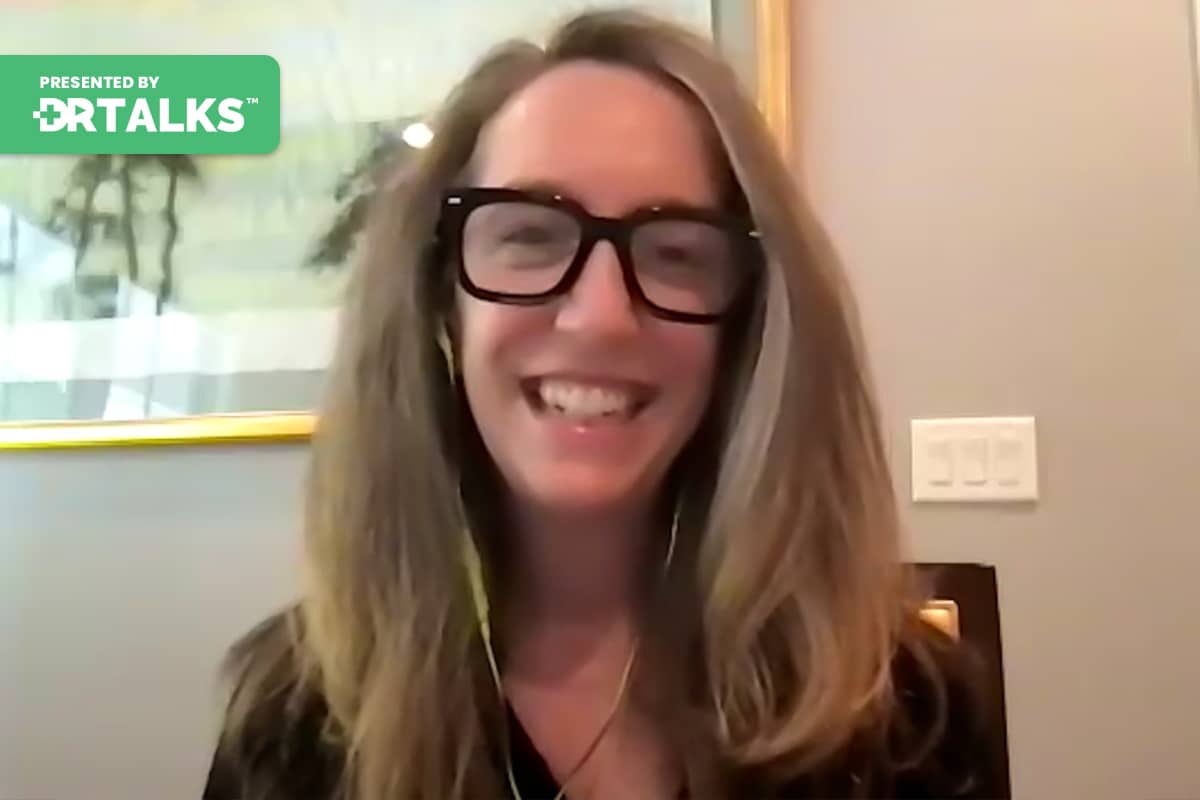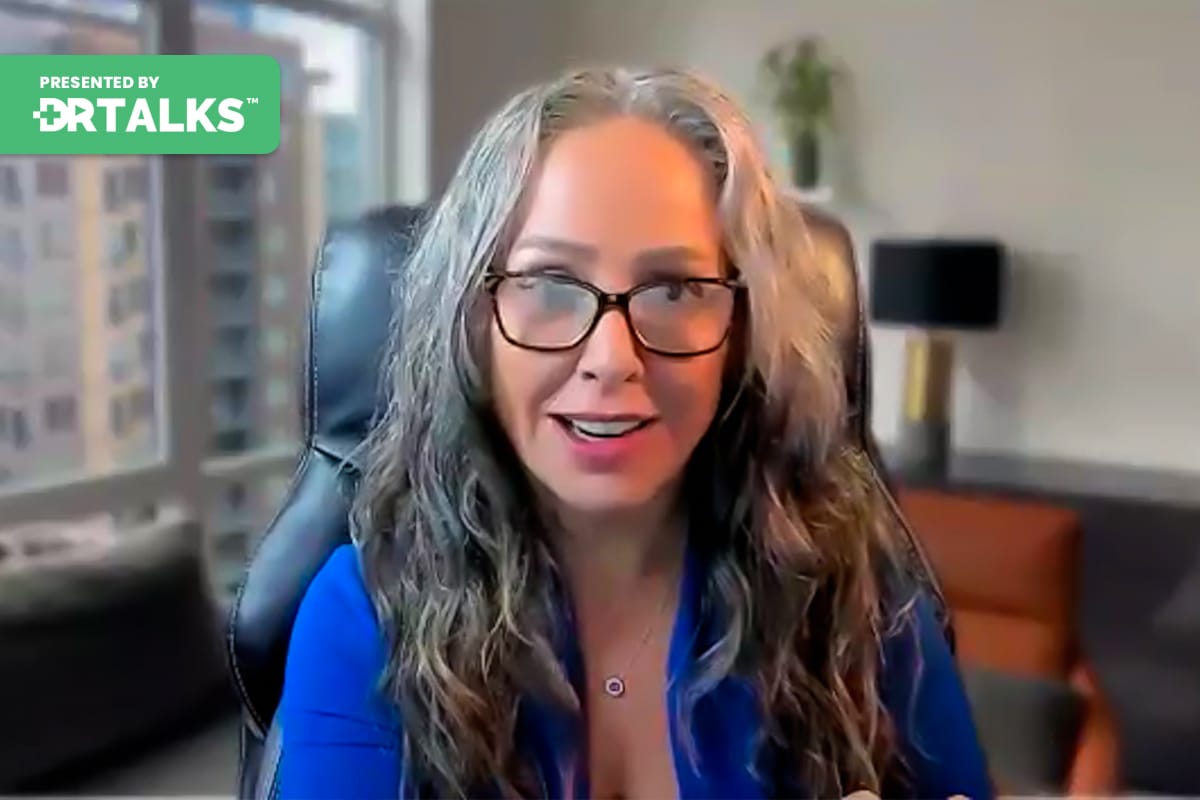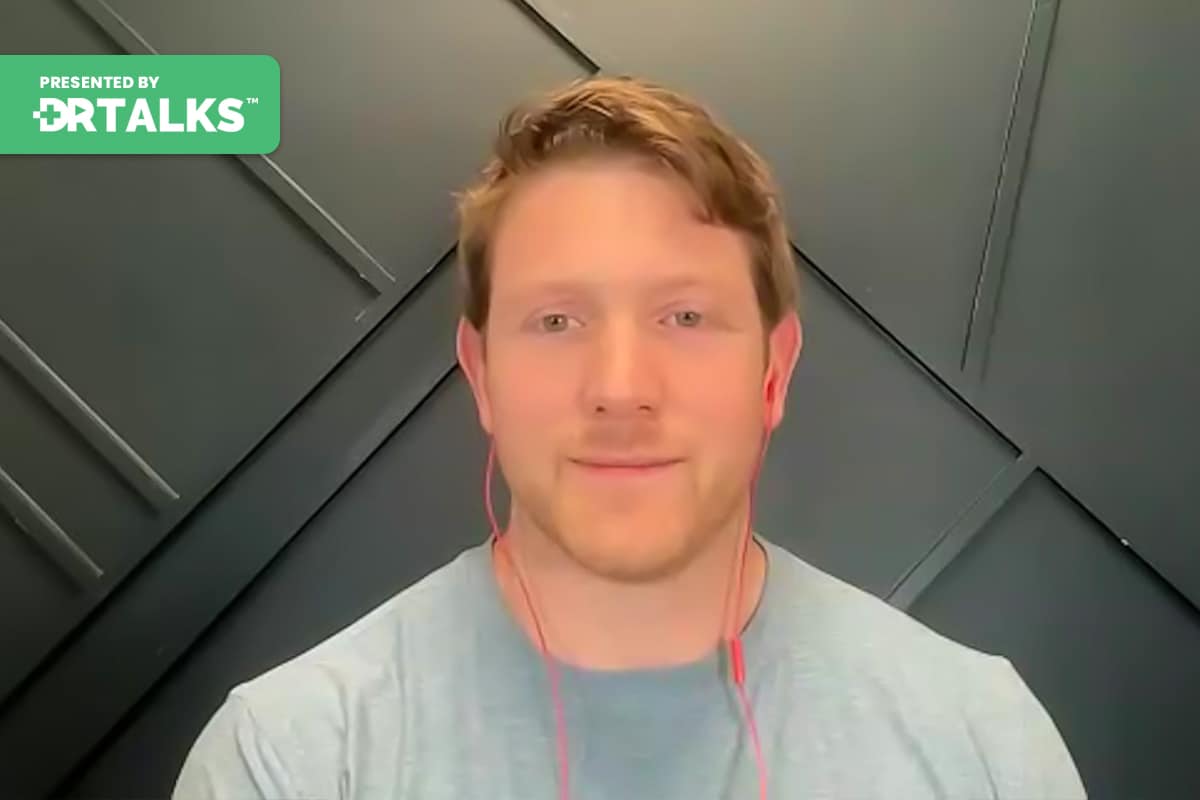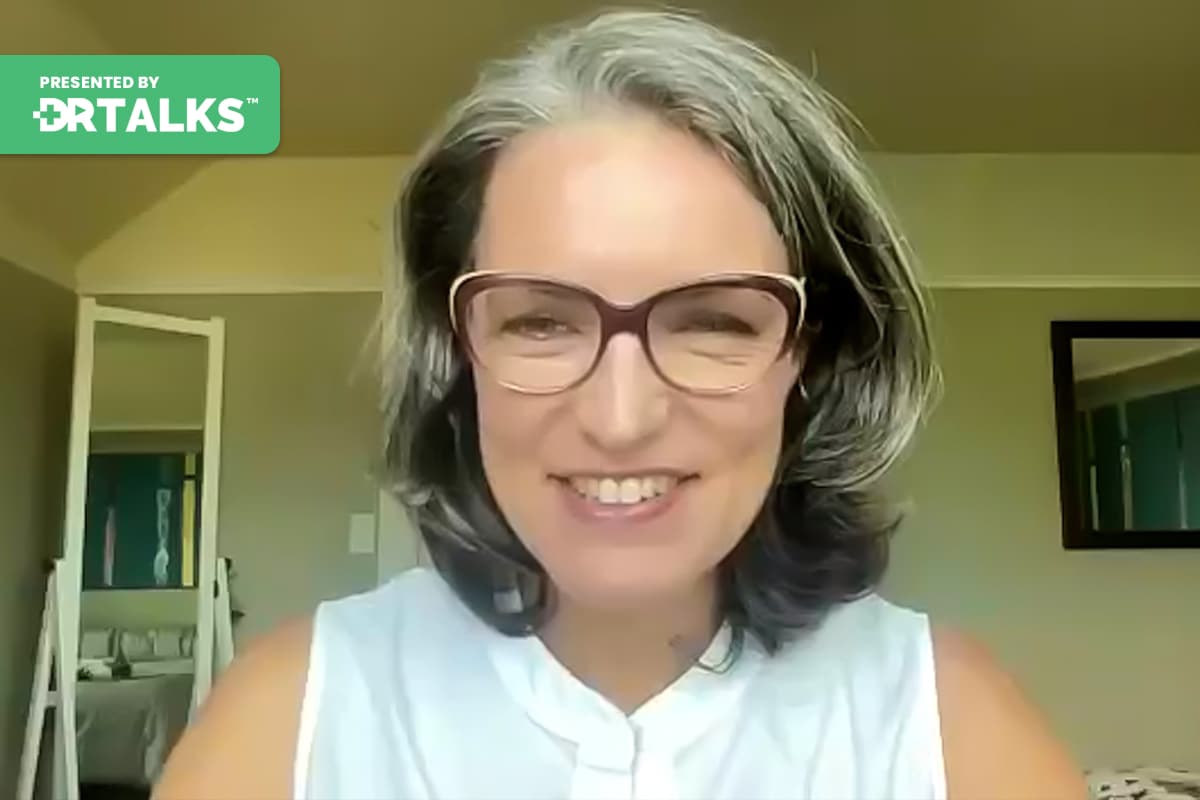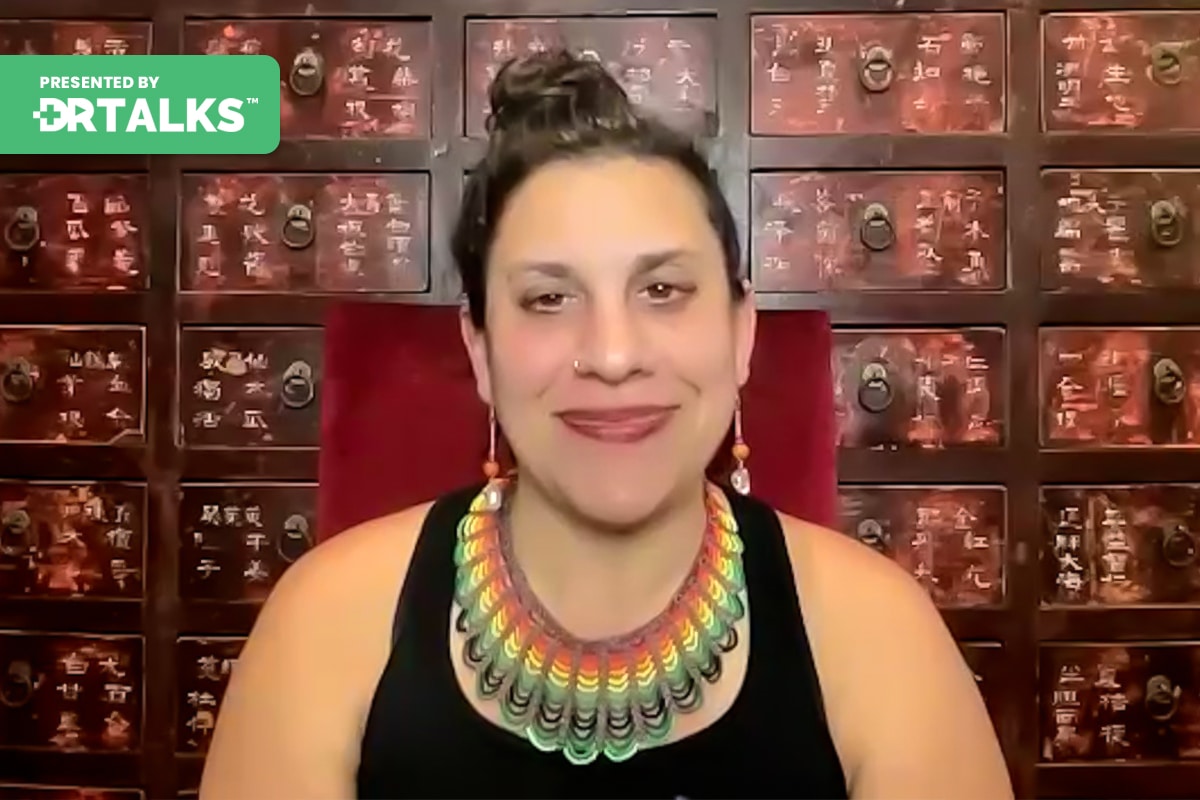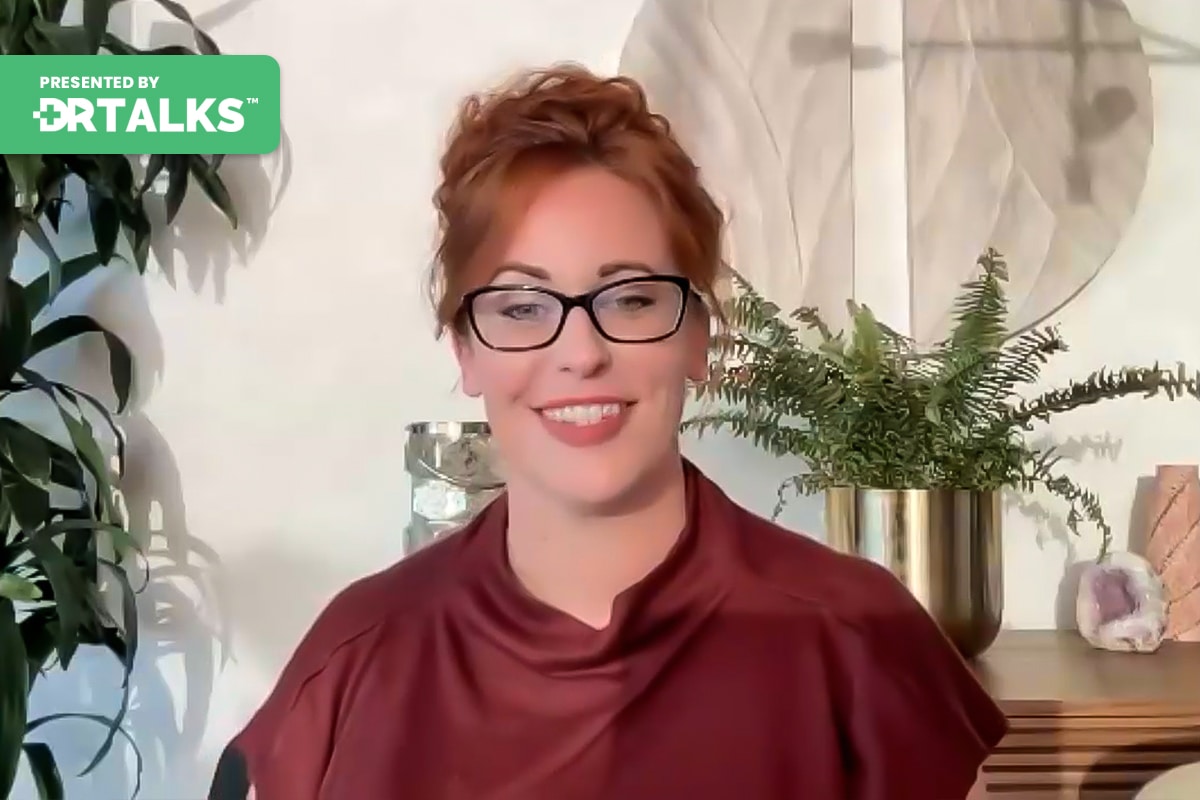Join the discussion below

Sinclair Kennally, CNHP, CNC, is a former chronic illness survivor turned health activist. As an award-winning expert on chronic digestive illnesses, CEO of DetoxRejuveNation.com, and host of Your Health Reset Podcast, she's on a mission to help people discover the real reasons behind their health issues, and take their power... Read More
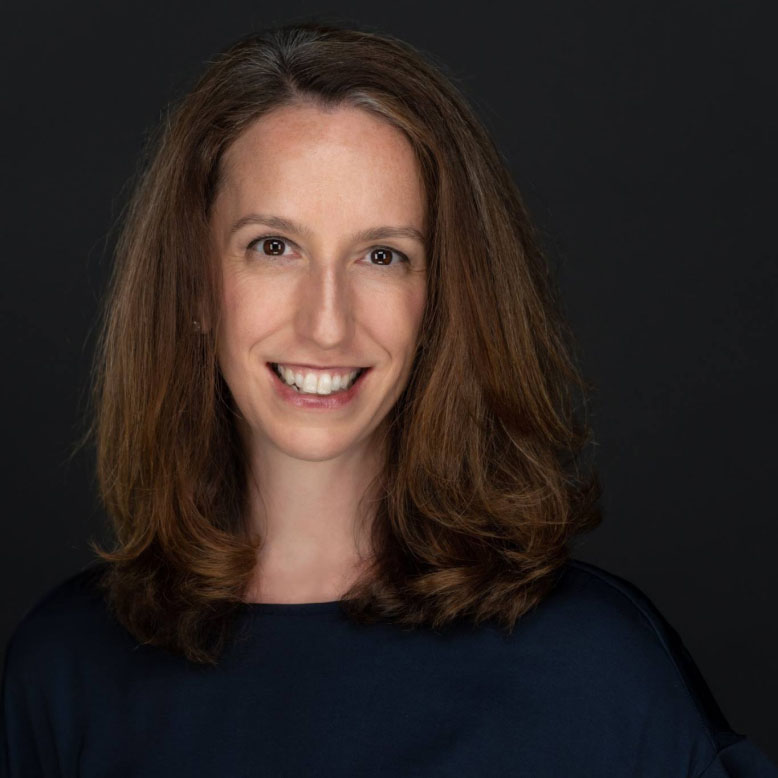
Jessica Drummond, DCN, CNS, PT, NBC-HWC
Dr. Jessica Drummond is the CEO of The Integrative Women’s Health Institute and author of Outsmart Endometriosis. She holds licenses in physical therapy and clinical nutrition and is a board certified health coach. She has 20 years of experience working with women with chronic pelvic pain, facilitates educational programs for... Read More
- Understand the three main root causes behind the surge in gut issues
- Learn the essential steps to address and remove these root causes effectively
- Gather insights into what both allopathic and functional medicine often overlook in treating gut conditions
Related Topics
Autoimmune Disease, Autoimmunity, Chronic Illness, Endometriosis, Gut Health, Hormone Health, Infections, Inflammation, Mold, ToxinsSinclair Kennally, CNHP, CNC
Welcome back. Continuing our conversation on Reversing Chronic Gut Conditions. I’m your host, Sinclair Kennally. And today I am joined by the wonderful Dr. Jessica Drummond. So Jessica or Dr. Jessica has been super passionate about supporting, caring for and empowering people who struggle with women’s and pelvic health concerns throughout her entire 24 year career. So she started out working as a physical therapist and also clinical nutritionist, and she has now a trademarked approach that is holistic, multi-pronged, comprehensive, and provides science informed research, functional nutrition, application, lifestyle medicine strategies and nervous system regulation, hormone balanced physical menu therapy, and so much more. So Dr. Jessica is very heart centered and also equally about the research. Super passionate about spreading this information. I knew that you guys would benefit so much from her expertize, so I can’t wait to dove into endometriosis and gut issues today with you. Dr. Jessica, welcome.
Jessica Drummond, DCN, CNS, PT, NBC-HWC
Thanks so much for having me. It’s my honor to be here.
Sinclair Kennally, CNHP, CNC
Is this area of expertize so important to you? Why are you so impressed? Passionate about this?
Jessica Drummond, DCN, CNS, PT, NBC-HWC
Yeah. So when I was still working in kind of conventional medicine as a physical therapist, I pretty quickly, early in my career, focused on women’s health concerns, which in physical therapy, what that looks like is a lot of chronic pelvic pain, a lot of incontinence, a lot of post-surgical rehab around breast cancer and other cancers. You know, pain relief for people in pregnancy and postpartum. And our most challenging patients really struggled with these complex chronic pelvic pain conditions. Endometriosis being one. And especially back then. This was more than 15 years ago. The surgeries were not nearly as skillfully done. You know, I’d have a lot of patients who were on their 16th or 20th surgery. They had a stimulators implanted. They were addicted to opioids. It was a very the treatment strategies for the delayed diagnosis were terrible. And then treatment strategies were also not great. And our even our physical therapy tools had limited impact because the pain was so significant. And then eventually I myself dug deep into functional nutrition. I got a doctorate in functional nutrition several years ago and back in 2004 or five, somewhere in that range, I sort of integrated all of those tools because so many people with chronic kind of reproductive pelvic pain, if you will, endometrial basis and dyspareunia and things like that. And dysmenorrhea also have digestive issues. In fact, the latest data is that 90% of people with endometriosis also have digestive issues. And so we couldn’t optimize endocrine function and immune function, which we didn’t even think to look at at the time. We were just kind of thinking about like musculoskeletal pain management. But slowly, over the years, as I’ve been doing this work and educating thousands of practitioners around the world, our combined experience with clients has taught us so much about how we have to optimize digestion, not just to reduce the digestive symptoms of endometrium CIS, but so that the endometriosis symptoms also improve.
Sinclair Kennally, CNHP, CNC
Yeah, that’s beautifully said, and thank you for underscoring that connection here. I’m really on a mission, one of many missions to make sure that people realize just how interconnected the reproductive system is to the digestive system and to stop talking about this, that they’re disparate because they’re deeply inform one another. And so to really talk about reversing chronic conditions is often, you know, you have to bring in the reproductive issues as well, just for a basic level, right?
Jessica Drummond, DCN, CNS, PT, NBC-HWC
Yeah.
Sinclair Kennally, CNHP, CNC
So, okay, this is super common. We’ve established that 90% of people are suffering from endometriosis. So. Or have gut issues. What are the most common digestive issues for people dealing with endometriosis?
Jessica Drummond, DCN, CNS, PT, NBC-HWC
So symptoms are things like abdominal pain, which sometimes overlaps with the pelvic pain, but it can also be a quote unquote IBS diagnosis, which obviously doesn’t really tell us much, but is often related to symptoms of constipation, diarrhea, or both. In my practice, I see far more constipation and or kind of in the direct direction of constipation. But then sometimes when the menstrual cycle kicks in at certain stages, we also see like transient diarrhea, slow motility, overgrowth of bacterial or fungal infections in the gut, otherwise known as SIBO or SIFO and for people living with endometriosis, that term is endo belly, right? So the number one complaint is bloating and that can be sort of after eating anything. So, so many of my clients, when they come to see me, have gone either through the recommendation of a practitioner or often just through kind of their own experience on a very restrictive plan because they have heartburn, they have some motility, they have bloating, they have constipation, they have diarrhea. And all of this stuff like seems to be, at least on the surface, related to food sensitivities. Like everything I eat is triggering this bloating. And by the time they see me, they’re eating like five foods, or I even drink water. And now my digestion is, you know, as soon as I do that, I bloat. So the endo belly is actually a gut dysfunction. That can be a number of different things, but those are some of the most common underpinnings on SIBO and SIFO for sure. But why? So to me, SIBO and SIFO are not really a root cause. These are we have to ask a little deeper what’s going on below that?
Sinclair Kennally, CNHP, CNC
Yeah, beautifully said. Okay. So given all of that, one of the things that I’m always surprised by is how persistent this lack of awareness is. What do you think that is? What is really driving our slow level of understanding your slow capacity to uptake this even functional medicine? Why are we overlooking this? What are the myths that persist? You know, help us shed some light on this. Why? Why are we just talking about this now?
Jessica Drummond, DCN, CNS, PT, NBC-HWC
Well, I think even within functional medicine, most people who transition to functional medicine, it was sort of led by a certain subpopulation of physicians who do think more integrative in that systems approach than their conventional counterparts. But, you know, I uniquely came to functional medicine through physical therapy, which was a very different way than people were doing, especially, you know, 15, 20 years ago. And so it’s I think what happens is our conventional system, as you said earlier, is so separated by physiologic system. And yet our motto for the Integrative Women’s Health Institute has been for since it’s been started, don’t chase symptoms, optimize systems. And we could go even further to say what you said before, it’s almost never it’s never the case that these systems are disparate, that you only have to deal with one at a time. And I think that’s the problem, because when people think endometriosis, even though endometriosis itself is a systemic disease, it’s not really taught. Even in one of our colleagues is was the first female gynecologist in the US. She told me herself that they never had any training really on endometriosis like a few hours.
But it’s so common. 10% of women have an endometriosis and so I think there’s a lack of, first of all, just a lack of training on some of the basic issues. But I also think any time you’re talking about a sort of a complex, chronic illness that doesn’t have a simple sort of hero’s journey cure like go to the doctor, they give you this medication, you’re cured. Yeah, yeah. Which almost never happens, right. With any of this stuff that we talk about, it’s complicated. So very few people want to sit patiently enough to help someone navigate a recovery. Because it takes a while, it takes learning, it takes people tuning in to their body signals, it takes changing lifestyles, which is challenging. And in our current environment. And so I think there are a lot of factors to that, but those are some of the most kind of blaring reasons why, you know, it’s challenging to specialize, if you will, in any complex chronic illness because you can’t really over specialize in anything because you always have to be thinking of the larger picture. And, you know, this conversation is evidence of that endometriosis. 90% of people also have digestive issues and lots of other things in fertility and, you know, mass cell activation and disordered omega and mold toxicity. Right. Like none of these things are in isolation. So it’s challenging work for practitioners.
Sinclair Kennally, CNHP, CNC
Yeah, I think that’s really well said and it just takes a deeper level of education and commitment to, like you say, understanding how these systems weave together and really a deep commitment to the systemic approach to healing. Yeah.
Jessica Drummond, DCN, CNS, PT, NBC-HWC
Yeah.
Sinclair Kennally, CNHP, CNC
So okay, given that there’s such an overlap between people who are suffering from endometriosis, women, you know, because and actually, I think that we need to to slow down here because I jumped the gun and assumed that people who wanted to click on this interview would know what endometriosis is. But I think as we dove into the details, it’s really important to give a clinical definition here of what it is and what it isn’t. Would you mind doing that for us?
Jessica Drummond, DCN, CNS, PT, NBC-HWC
Sure. So any human with a uterus can have endometriosis and it is it. What it is is lesions, cellular lesions or aberrant cells that are similar to but not exactly the same as the lining of the uterus being found outside of the uterus. So by definition, an endometriosis is not in the uterus. Actually, if there is a similar condition called adenomyosis, which is similar aberrant lesions in the muscular lining of the uterus. So these aberrant cells and I like to think of this as similar to cancer, but not and I don’t want to say fear. It’s aberrant cells, although they don’t tend to be life threatening, they are very quality of life threatening, which is just as important to acknowledge. But I just for someone who has endometriosis, don’t panic. But you have these aberrant cells outside of the uterus, which have gotten there. We don’t exactly know how they got there. We do know that in female fetuses, there are about 9% have endometriosis, essentially pre birth. So it could be that these aberrant cells have been there since in utero, or it could be that they develop or proliferate from other kinds of cells.
The kind of disproven theory is that they are from reflux, menstrual blood, but there could be some of that. A lot of people have menstrual blood that is outside of the uterus that don’t have endometriosis. So there’s definitely some interaction between these aberrant cells and the immune system. And I think the other important thing to know about endometriosis is it is a systemic disease. So it’s not just like on fallopian tubes and ovaries, it’s in muscle, it’s on the liver, it’s on the pancreas, it’s in the lung, it’s inside the nose, in joints. It’s been found all over the body in nerves and definitely one of the most common places is on and around the bowel. And that’s one of the main reasons why if somebody has and and something like zero or SIFO, it’s really hard to treat there. It’s not going to just go away with a couple of rounds of rifaximin or even a more complex antibiotic regimen.
Sinclair Kennally, CNHP, CNC
Thank you for saying that. Yes, I completely agree. That’s what we see in our practice as well. So we just inherit those people who, you know, mostly women who fail out of those programs because that just does not allow for the complexity and doesn’t really get to the root cause. Yeah. Or handle the severity. So let’s, let’s really talk about the stent. So when should someone get assessed for endometriosis if they have these persistent digestive issues and these, you know, might we call them simpler approaches that are more popular when they haven’t see progress with those?
Jessica Drummond, DCN, CNS, PT, NBC-HWC
Yeah, I think if you are seeing that chronic bloating or dysbiosis, but even treating it with just herbs or treating, I think it’s not really the way we want to look at it. We want to think about supporting the body to heal. But even if you’re using herbs or antibiotics or a varied approach that integrates nutrition or even a lot of vagus nerve toning and motility support, if you’re sort of doing everything to optimize digestion, and that’s still struggling to really get the results that you want. Look for endometriosis growing on or around the bowel, the rectum look for pain with defecation, look for pain with menstrual cycles or intercourse. Look for pelvic pain in general, which is tricky to distinguish from abdominal pain when people have these chronic gut issues as well. The bloating is very characteristic and other reproductive symptoms overlapping. And sometimes, like I was just talking about a case of a woman in her early twenties who was really kind of going through all these complex paths for digestive optimization. And I said, you know, has anyone considered ruling out endometriosis? And then I was like, How does she have any period pain or whatever? And they’re like, Oh, well, no. But she’s been on hormonal birth control for like ten years. And while hormonal birth control is not a cure for endometriosis in about 15 to 30% of cases, it can suppress symptoms for a long time. So if someone’s on birth control and struggling to really recover from digestive issues, that’s a really good time to assess for endometriosis, especially in the abdominal cavity or around the intestines, anywhere along the tract.
Sinclair Kennally, CNHP, CNC
That’s really helpful. Okay. And is there any other fine details that you want to speak to about it from a clinical approach here? Like I really want to give you time to talk about today. What is the systemic approach to this? We’ve already talked about how, you know, there is no real one pill, one magic pill solution to issues like persistent gut conditions. Coupled with that, Dimitrios, what is your approach to like a holistic, sustainable progression with these issues?
Jessica Drummond, DCN, CNS, PT, NBC-HWC
Yeah, so we actually start we do all of these things sort of together. But first of all, there’s this there’s patients around this. So people really tapping into starting to be able to listen to what their body needs and nervous system regulation because as you know, people can’t heal when they’re stuck in sympathetic activation or a parasympathetic free state. So there are kind of three if you talk about three switches of the nervous system, you’re either in sympathetic, which is kind of like high anxiety, you know, upregulated parasympathetic, but free state, which is dorsal activation of the ventral activation of the vagus nerve, that’s where like you just can’t get moving, lean toward depression and feel very overwhelmed. So if you’re feeling like this conversation itself is overwhelming, that’s fine. That’s where we meet. A lot of people don’t panic. We can start there. And then there’s kind of what we call the rest digest, nourish, feel, state. You know, you’re in it when if you think about when you go like get your hair done and somebody massages the back of your head and you just feel like you’re feeling completely relaxed. That’s active, that’s direct activation of the vagus nerve that is the state in which we can heal. Most of my patients with endometriosis or any other complex chronic illness spend a little bit of time in there every week or two, but we want to be spending like ten, 20 hours a day there. So we have to really layer that in. That is very important. And then we start with actually digestive optimization because otherwise a lot of our tools supplements and things like that don’t work as well to regulate immune system. So we have to make sure you’re absorbing nutrients and you’re eating calmly, mindfully, that you’re not afraid of food.
We have to talk a lot about leaning in the direction of eating disorder, which may have happened from being in pain every time you eat since age 12. I think the other thing we don’t talk about that enough is the diagnosis. The symptoms of endometriosis tend to begin around pre puberty between eight and 12, 13, 14 with digestive symptoms. So there can be a whole run around at that time, around fear, around eating. So nervous system regulation then layered with digestive optimization, which for me is about starting with opening the windows and doors. Right. Do you having at least 1 to 3 really good bowel movements a day? Because otherwise we can’t detoxify which we need to do also. And then we talk about mindful eating. We use a kind of gentle, clean nutrition but I’ve I’ve leaned the less into really any dietary changes we start with adding nourishment. And while that’s counter to the research on the Low-Fodmap diet, I think it’s so much more important to optimize the nervous system, to not be afraid of food, as to worry about exactly what people are eating all the time, and to instead focus on motility.
We use visceral mobilization, we use ginger artichoke, timing of meals, exercise, intermittent fasting, but not necessarily long periods of fast initially, but just spacing between meals so the digestive system can rest. Chewing. Chewing is probably the most important thing, you know, and I know some of the things I’m saying seem crazy simple, but that’s what’s missed. And when you don’t slow it down, to start with a real foundation of nourishment, absorption, nervous system regulation and opening the windows and doors, you can give people just buckets of supplements and aggressive detoxification strategies and they’re going to feel much worse, which is going to make them panicked to continue. So they’re often is a period of time in recovering from these complex chronic illnesses where things are a little rocky when you’re trying to detoxify, when you’re trying to get the gut to accept more nutrients, when you’re trying to eat more foods, you know, oh, I’ve had a little more digestive symptoms. Okay, you know, that’s fine. We want to be able to put those things into context. And when people really start have slowed down enough in the beginning to understand what their bodies are telling them. They’re not afraid so much of the rocky ness and they can go through it more quickly, whether that’s detoxification or improving digestive function or optimizing gut dysbiosis, things like that, it’s not as scary. And so the immune system is also then not triggered by the nervous system being scared, if you will. So we have to kind of do this in a very patient environment. I say to my clients, we can only support you, you can only heal at the pace of your nervous system, which is highly dependent on how safe you’ve been in your entire life. And so I can’t rush that. So we’ll start. You know, it might take three months. It may take six months. It might take three years. You know, it’s not like you go from you’re going to feel terrible for three years and all of a sudden you’re going to get better. You’ll get better over time. We call this the upward spiral of healing. But those are that’s kind of the systematic approach, integrating nervous system, digestive system, immune system. And then in most cases, so most of my patients are aware they have endometriosis somewhere between the ages of like 15 and 40, early 40s. It gets a little tougher when you’re in your 40s, 50s, 60s, because unfortunately, menopause does not cure endometriosis. It’s not an entirely estrogen driven disease. So in perimenopause, then we also have to do things a little bit differently to sometimes optimize the hormonal environment because younger women 20s, 30s just dealing with nervous system, digestive system, immune system, the endocrine system sort of shakes itself out, if you will. But later or that’s not always possible. And if someone’s overlapping that with perimenopause symptoms or menopause symptoms, we can’t just patch on hormone replacement therapy because it can irritate the endometriosis. And so there’s it becomes another sort of gentle dance in that phase of life as well. And same thing with things like, you know, osteoporosis us for prevention in the sixties, you know, things like that. We just don’t want to always just use HRT until the environment is optimized for it and sometimes not at all. We can sometimes use other strategies.
Sinclair Kennally, CNHP, CNC
Okay, so there’s a lot of clinical gems in what you just shared and I want to go back and just underscore a few of them. Yeah. So one of the things I like about what you said is really optimizing the nervous system support piece so that as you’re eating, you’re not training, you’re retraining your body to not be afraid of food. So many people that come to us have a similar issue where they’re basically orthorexia, you know, they’re down. They’ve been trained the hard way, you know, unfortunately by trial and error that their body just will not accept many foods anymore. And while that is a very that’s that’s just reality. Yeah.
Jessica Drummond, DCN, CNS, PT, NBC-HWC
Right. So they definitely have in tests increase intestinal permeability but slowly.
Sinclair Kennally, CNHP, CNC
Yeah. You’re not going to heal that without nervous system support and retraining of the body to lower reactivity. So that’s really a piece that I hope the audience picked up from you. And I also really appreciate you saying the meal time piece, because we always say a grazing body is not a healing body. You have to give your body breaks to how to repair the digestive tract. If you’re working with something that’s complex and systemic. So thank you for pointing that out. And I also like the piece that you were talking about. Oh, gosh, I missed there were so many good gems about different phases in life. Thank you for breaking that down pre during and menopause as well because there’s different rules of engagement here. Right.
Jessica Drummond, DCN, CNS, PT, NBC-HWC
Right. And it also depends on the course, the client’s goals. And you know, someone who’s 14, 15, it really their goals are going to be very different from someone who’s maybe trying to get pregnant or that’s the phase of life or in the postpartum recovery or perimenopause, menopause or past menopause. When we’re worried about strength optimization and yeah, osteoporosis and cardiovascular disease and the things that are, you know, obviously all of that stuff we would love to start taking care of at 14, but, you know, where our clients are at different parts of their lives also matters. And so many of my clients with no mistresses are just very driven people and they’re used to living with and through a lot of pain. And so there’s a rewiring, the nervous system that has to happen, too, around that.
Sinclair Kennally, CNHP, CNC
Beautifully said. Yeah, I agree. Okay. So you’ve mentioned the word detoxification a couple of times, and this really is my love language, so I’m really glad to hear you bring it up because I do find it to be an essential layer for being alive in this time. And I’m so curious as to what you see. By the way, I totally agree with you about the systemic approach. Let’s not do harsh detoxification. We need to prepare the body to release your obviously have compromised excretion. If you have compromised digestion and absorption and you have you’re dealing with a condition like endometriosis. Right? So, yeah, let’s be smart about this guy. If you’re listening, please be very, very discerning about any steps you take, you know, under the umbrella detoxification. So what do you see as some of the biggest factors? And there’s just new data coming out all the time about gut conditions and endometriosis and the potential toxicant drivers. What do you see as some of those biggest environmental factors at play?
Jessica Drummond, DCN, CNS, PT, NBC-HWC
Well, absolutely. As you know, estrogens or any kind of xeno hormones, you know, I’ve had people have complete symptom relief from stopping, you know, taking out the plastic water bottles and that sort of thing. But the thing that then really pushed them over the edge, I had one client was in a really hot climate. She stopped wearing plastic flip flops. Huge. And now we’re seeing that so many of our like athletic wear brands and things like that have our clothing brands, have microplastics in them. There’s a funny me and my shared on our social media a couple weeks ago or a couple of days ago with the whole Barbie movie thing, and it was like, we’re all living in a Barbie world. And then it was like in parentheses, microplastics. So it’s that’s true. We are and it’s in our water. It’s in our food containers, it’s in our clothing. So lowering the toxic load of, you know, any kind of microplastics the best you can. And again, this is a little bit like the food restriction. We can’t also panic about it because we have to live in this same thing with mold. Mold is complicated, too. And yeast, those two things very common. And people with endometriosis. And so, again, there’s a lot of discussion and functional medicine around. We have to get away from it. You have to move. You have to renovate your entire house. And while sure the less exposure you have, the better. I just feel like that’s the same conversation that we were having around food restriction five years ago. That is just going to scare the nervous system for no reason. There’s mold and leaves. I mean, you can’t get away with it. Get away from it. What you have to try to do is make the nervous system or the immune system less reactive. So any time we can lower the toxic load, great. That’s important. But also we have to give the body nourishment to be able to process the magnitude of the toxic load that we’re living in. Because I think we can’t even know what that is at this point. It’s out of our hands, right? Like the world is toxic. And so we don’t since we can’t really unwind that, you know, dial bowel movements, hydration, sweating enzymes, which I start with food juices. And again, you don’t have to be entourages fast for 30 days. You can just start drinking more raw vegetables. I start with juices. When I start with raw with endo because so many people have bloating. So they can’t tolerate raw fruits and vegetables yet. Right. Cooked soups. I mean, first, a lot of people start we add three times a day. Just keep it simple, because a lot of times people are very fatigued, anxious by the time they see me. So breakfast, lunch and dinner, eat soup with some vegetables in it. You know, let’s just start there. And I think the more we give enzymatic support, the more we give nutrient density, and the more we make it easy for the digestive system to function. The detox processes can be further supported. And of course there’s a lot of supplemental tools we can go deeper, but you often don’t have to, first of all. And secondly, that day to day detox, understanding is such a valuable learning tool for all of our clients that they can just do it themselves, you know?
Sinclair Kennally, CNHP, CNC
Yeah, I really appreciate you marking out the what I think are some of the core tenets of an appropriate detox, which is really focusing on absorbable foods so that you which is going to be different for everybody, right? Individuality is real. Your exposures are going to be different, your symptoms.
Jessica Drummond, DCN, CNS, PT, NBC-HWC
But yeah.
Sinclair Kennally, CNHP, CNC
You can absorb it. You have a better chance of using it. And most of us are underfed or overfed, but malnourished. Yeah. So if you’re not observing you food, it doesn’t matter what it is. You’re just adding work to the body and distress to the body. And I also appreciate you saying that the piece about reducing ongoing exposure and doable steps, because there’s parts of this that we can control in the process of this, that we can’t just focus on those variables, like your amazing client who started wearing flip flops. Oh, my God, I’ve never even heard that before.
Jessica Drummond, DCN, CNS, PT, NBC-HWC
Right. And it didn’t really occur to me, except I was like I was in Houston at the time and I thought, you know, where else can you be getting plastic from? I figured, let’s figure, let’s try this. And but the other thing I do think is I think enzymes have been understudied in endometriosis because we do have a lot of people using things like sara peptides. About 12 and a half percent of people with endometriosis use it and really, you know, report an improvement in their pain. But we don’t have anything beyond that survey research. So and.
Sinclair Kennally, CNHP, CNC
I think so.
Jessica Drummond, DCN, CNS, PT, NBC-HWC
Yeah. And I think the reason that, you know, 12 and a half percent of people who are surveyed who have endometrium says use their peptides and similar things for pain relief. And I think that, you know, we don’t know why this works, but to me I think it’s supportive of both digestive function and detoxification because if you don’t have that enzymatic support, you can’t have kind of the deep clean up of your colon, if you will, and processing and absorbing as you’re talking about. So I think that’s something we need to look into more in this population. I think the other thing that happens, too, is this is a population of relative hypoxia. And we know in relative hypoxia, chronic viruses can grow. There’s an overlap with things like I’ve seen Barr and long COVID and things like that. And so we do want to think about how we can improve oxygenation with anything from breathing patterns to there are mouse, there’s mouse data in hyperbaric oxygen. You know, even exercise helps better oxygenate the system. So, you know, I think that’s something that we want to improve to allow for the body to be able to detoxify.
Sinclair Kennally, CNHP, CNC
Yeah, I’m really glad you mentioned that, obviously, because that at a basic level, everybody listening and we got to remember that, you know, I’m living stream one’s clean and if you aren’t in a state of flow, no matter what system of the body you’re talking about, you’re going to get the secondary infections that just.
Jessica Drummond, DCN, CNS, PT, NBC-HWC
Flourish.
Sinclair Kennally, CNHP, CNC
And they don’t go away.
Jessica Drummond, DCN, CNS, PT, NBC-HWC
And that’s why we need gut motility. Right. But we can’t always get it with endometriosis. So we have to think about that, that sometimes even if you had a perfect excision surgery, there’s left, you know, inflammation or scar tissue or whatever some do or sometimes there’s a been a partial bowel resection, so you don’t have an earlier cycle valve. And so the stream of the immune system may have some bumps and I mean, the digestive tract may have some bumps in it. So visceral mobilization therapies, but also things like knowing that something you’re going to have to manage. So you may be taking enzymes and or antimicrobial herbs in bursts forever just to kind of it’s almost like doing a beach cleanup or a river cleanup, as you will. We have to keep doing that because there’s a structural issue that may never fully resolves.
Sinclair Kennally, CNHP, CNC
Yeah, what a great point. Okay. So we have introduced a lot of concepts today and a lot of different therapeutic approaches or layers to a systematic or systemic therapeutic approach. And what would you say? I think? A great way to recap for everybody is your priority order essentially of addressing the digestive root causes and endometriosis, the like. How do you layer in these therapies? Why don’t we give you a chance to organize this for everybody?
Jessica Drummond, DCN, CNS, PT, NBC-HWC
Yeah. I mean, I think just to summarize what we just talked about, nervous system regulation is kind of foundational. Then nutrient absorption, chewing meal timing, bowel movements, you know, digestive flow, if you will, and immune system support, which can be with nutrient it’s can be with herbs, can be with better sleep patterns. You know, there’s lots of tools and then as needed more specific and recurring kind of supports which which will be less needed the younger you are in most cases.
Sinclair Kennally, CNHP, CNC
Thank you so much for sharing your wisdom with us today. Dr. Jessica, is there anything you’d like to add? I think you and I both have an affinity for this complex population and that maybe doesn’t get attended to so well in other corners of medicine. And I know for so many people who are listening, especially those who have made it to the end of this interview, they’re really on the hunt here. They know that they’re in charge of their healing process. They’re just looking for that little bit of, you know, insight or the clinical gem they haven’t heard before or just what is my next step? You know, what words of encouragement can you and this would be for those folks.
Jessica Drummond, DCN, CNS, PT, NBC-HWC
Yeah. I mean, I think most important words of encouragement is I’ve been doing this for a really long time now. Probably 20,000 patients and people get better. People get very well. People live learned to live very healthily despite having some kind of underlying vulnerability. And who doesn’t. So that capacity is there. And then, you know, visit us at our website, integrativewomenshealthinstitute.com. We do have an endometriosis certificate program that is relevant and valuable for any professionals in the women’s health space. But also we have it open to people living with this complex chronic illness themselves, even if you’re like an accountant or something, even if you’re not in health care at all, because quite frankly, people living with this condition are very knowledgeable about it. And so we’re there to support you and train you to help and support yourself at the highest possible level. So you’re welcome to take that certificate. We also do work occasionally. You know, we have small groups of one on one clients. If you need that deep dove perspective on your own case and you can follow our work on Instagram @IntegrativeWomensHealth.
Sinclair Kennally, CNHP, CNC
I think. Thank you so much for sharing your wisdom with us today. Really appreciate.
Jessica Drummond, DCN, CNS, PT, NBC-HWC
It. Thanks so much for having me.
Downloads

